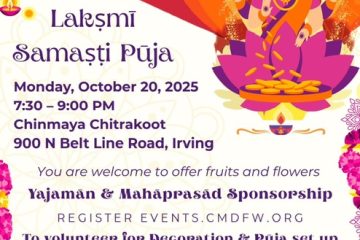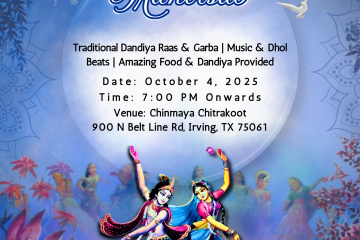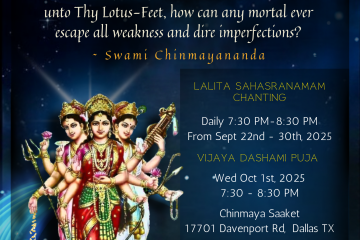Significance of Dussera
Three aspects of Mother Divine
Symbolised by Navaratri Festival
Swami Chinmayananda
The following are excerpts from a long letter written by Swami Chinmayananda from Uttarkasi on 20th October
1950, which happened to the Vijaya Dasmi Day to Sri. P.B. Menon of Ernakulam, Kerala, and published in “Glory of the
Mother” by Central Chinmaya Mission Trust, Bombay.
Religion without philosophy is superstition. Philosophy without religion is mere theory. And nowhere is the wedding of
these two so perfect and enduring as in the great religion of Hinduism.
Religion, everywhere, includes three sections: the ritualistic forms and symbols, the mythology and the philosophy. These
three are three stages regular, systematic, measured and graded. A deluded jiva (embodied soul) is to be taken from
the first, through the second to the last. Since the first two are preparations for the third, the previous ones also must
have for their basis the essence of the last. This is true in Hinduism. All our rituals and mythology represent the truth of
Vedanta. Self-realization through a constant God-consciousness is the message, be it in the ritualistic stage or in the
mythological stage of evolution.
In this light let us view Navaratri, the nine day’s Devi Puja and the glorious end of it all on the tenth day,
the Vijaya Dasami. What do we do in these nine days? Every house is cleaned, and there is an air of festivity in the
entire village or town. Each house is converted for these ten days to serve as a temple. For ten days there is regular
pujas, kirtans, songs, and reading of the spiritual books.
Now what exactly is the procedure? These nine days are divided into three sections, each three days; the first three days
are dedicated for Durga or Kali, the second for Lakshmi (the Raja Rajeshwari) and the last three days for Goddess Saraswati.
The nine days’ puja ends in the great festivity and joy inexpressible, on the tenth day – the Dussera Day, the
Vijaya Dasami Day. Thus the ritual, with forms and symbols – “the burning of the Devil” at the dawn heralds in the
Vijaya Dasami, and the merry laughter and joyous feasting.
“It is all very well. At best it is a crude communal festivity, once a year, just after the harvest season is over
for the winter.” This is the opinion generally of the blind, college-trained-illiterates of our young brethren! In this
age of intellectual idleness, the generation has neither leisure nor the spirit of enquiry to make them think and understand.
All their thinking is done for them by the editors (and) the news reporters.
But let us be honest to ourselves and make an investigation into this exact ritual, most popular even today among us. Some
light may come out of all honest and persevering enquiry.
WHAT THEN DO THESE NINE DAYS OF CELEBRATION MEAN?
The first three days we invoke Sri Kali Mata: Mother Durga. Durga is the “Power Terrible” that manifested out of
the Unmanifested Eternal which is paripurna, (full or complete in all respects) and so has in THAT all powers.
“Mother Terrible” took the “form dreadful” to kill and end the rakshasas (devils) that were
roaming about the world of men, tyrannizing over the faithful, the devoted: the divine sadhakas (spiritual seekers).
This is the story in a nutshell as we read it in the Puranas. The Puranic stories are all, Chinmaya repeats, all figurative
voiceless truths of the Upanishads, the Brahma Sutra and Gita – the great oceans of the highest philosophies in the world.
Puranas are written for the crude and uncultured to grasp. It entertains, flares up imagination, kindles faith, and makes
the reader live a life of righteousness and enduring values of love and dharma.
Yes. Surely, man, the imperfect, the bound, the sorrowful, has a thousand enemies within. He is riddled with negative
thoughts, fears and yearnings. There are desires, passions, lusts, hopes, vanities, anger, greed, selfishness, jealousy,
meanness, prejudices and hatreds – just to mention a few of the most terrible. If the sadhaka has to get rid of
these lawless villains within, in Mother Kali’s krpa (mercy) these tyrannous monsters are to be annihilated. No
amount of soft persuasion can be of any avail with them. The force of Sri Rudra must be applied. There must be a deep,
determined, adamantine resolve, and a fight royal within, as bloody as the Kali’s ferocious dripping-sword; and unless the
sadhaka is ready to wear about his neck the skull-garland of these murdered false values, there can be no peace or
order in the within. So then, the first three days – representing the initial stage of a sadhaka who has started on
his pilgrimage to freedom and perfection – are the invocation of the Mother Terrible. This power is also in us; it is only a
question of invoking it. The self within is omnipotent; every power is in it. Only invoke any power you want, it will
manifest according to the degree of invocation. In your chair and table is fire! Only it needs invocation; set fire: tend it:
nourish it until it is well set – thereafter the whole house can be brought down by that very chair on which you are so
comfortably sitting now! Just look around: the almirah, the windows, the doors, the table, the shelf each containing some
thousands of calories of heat. And yet, when not invoked, you are comfortable with them: yet, all the same, the fire is
full-packed in them. Invoke the fire, and what a terrible conflagration! What a terrible heat!
So also the Self has all the powers in it. When we know the trick of invoking whatever power we want at will out of it,
we are the masters of the Self. Supreme perfection is only in the Lord, the Self. To become the Lord is the state of the
Absolute from where there is no return. He who has attained this state is a jnani.
Thus, as we have seen, the very first stage in self-perfection is to invoke the Mother Terrible, to help us by eliminating
from within us all negative forces all weaknesses. It is these that have removed us from ourselves: the Supreme
Paramesvara svarupa which we all really are!
Now a mere elimination of our weaknesses in itself is no achievement permanent; for, if the bosom is thus empty, they will
again enter by the “back doors”.
So then, we must understand that though we have to eliminate many wrong trends of thinking, acting, feeling and asserting
that are now with us, we have to also side by side invite in, plant well, cultivate, collect or learn new healthy enduring
values. In short, mere negative sadhana (spiritual practices) alone is of no avail; we must equally emphasize the
positive side in our right effort: then only the purushartha (four factors necessary to make life full –
dharma or right action, artha or wealth and happiness, kama or desires and aspirations and
moksha or spiritual realization which is the ultimate goal of all existence) becomes complete and whole. Not only
strive to assert that “I will not be dishonest” but in the same breath, as it were, we must assert “I will be
honest at all costs”.
Fear is meaningless. I am not afraid of anything – I am Courage Absolute. I am He: He am I. I am courageous. Nothing is
or can be there which can frighten ME.
By such an invocation of the positive, we grow! This growth is the next stage that should follow the efforts at
elimination and self-purification of the sadhaka. And this is the meaning of worshipping the Goddess Raja
Rajeshwari, Sri Maha Lakshmi, the lady of all aisvarya (divine wealth).
In the first three days through the “Power Terrible” we have met, fought and killed the devilish tendencies in
us. The rakshasic forces have been won over. This period of war is immediately – and even side by side followed by
the constructive efforts at the organization of order and security by patronage of order and security by the patronage and
growth of the Divine Forces in us. Lakshmi is not the Goddess of rupees and paise. She is the Goddess of Aishvarya: Daivi
Sampatti, divine wealth. She is the embodiment of Love, charity, kindness, devotion, peace, tranquility, honesty, courage,
faith, and mumukshutvam (desire for liberation).
These are to be engendered, and the vacancies created by the elimination of the negative qualities must be filled in by
these positive traits.
Hence the Lakshmi Puja for three days following Kali Puja of the first three days! How pregnant!
When a jiva on his march has thus purified himself, and gets recharged with the Daivi sampatti (the
divine wealth), he is a fit adhikari – a fit student – to be initiated into the philosophical side of religion. He
is told of the supreme Reality, the state of sat-chit-ananda (absolute Knowledge, absolute Existence, absolute Bliss,
the padvi (state) of sivoham the becoming of the Lord, the merger of the jiva to become
Mahesvara, the final waking from this dream of samsara into realization that “I am the all-pervading
knowledge in itself. Pure existence beyond time, space and causality – where the experience is I am God”. This knowledge
is the last and final stage in the evolution of man. There the mortal rises to become immortal. Death has no more strings
for him – beyond death, beyond birth, beyond maddening cruelties of dharma and adharma, pleasure and pain,
heat and cold, success and failure, love and hatred. The sadhaka drops his deluded conception “I am a man,
devotee”, and realizes, remembers – I am He (Nitya-mukta-chinmayoham!)
With the jnana (knowledge) that I and Siva are one – I in Siva – Siva in me – Siva is jagat –
jagat is naught but in Siva – Siva alone is “I am”: the man has risen to Godhood. Jnana is the
last stage through which sadhaka – the bhakta (devotee) walks to reach this native house of his, the
Param Padam ( Supreme State) – stage of absolute Perfection.
The Goddess of Jnana is Devi, Mother Sarasvati. Her veena is tuned within when the heart strings are
polished off it’s clogs – the asuric sampatti, non-divine traits. In the resulting peace, the bhakta sees
his Lord in the peaceful, purified within. The soft floating tunes waft from within as the Lady of the veena passes
Her tender fingers blessingly over thy heart-strings. The Siva bhakta melts in that music of the within and becomes
one with Siva!
Now “I am He, He am I “. This is the great victory . . . . .the total victory, the VIJAYAM.
Thus in nine days, in three stages, even the ignorant is made to go through the right invocations in their required
sequences of worship, and on the tenth day, make a huge bonfire of the devil, the samsarin in me – the mortal, who
dreamt, and wept his dreams.
Now you know everything. As a Guru, Chinmaya has initiated you to the vidya supreme – the para-vidya.
You are told about the destination – you are told about the route. Enough “means-to-go” have been placed at your
disposal.


